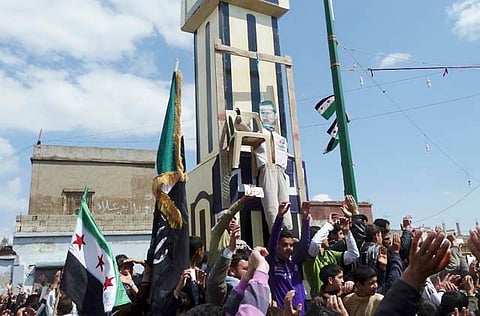Arm the rebels to end strife in Syria
If the regime is allowed to perpetuate the massacre without a second look from the world, there will never be a diplomatic solution

The current debate over whether it is right or wrong, legitimate or illegitimate to supply arms to the Syrian opposition has moved wide off the mark. The real issue now is whether it is right or wrong to allow a brutal dictatorship to massacre its own people in front of the entire world, and in front of the camera.
The situation in Syria has reached a practical and moral dead end. Six months of non-violent popular protest was met with an extremely violent reaction from the regime, and no less than 5,000 peaceful protesters lost their lives in these demonstrations. Secondly, the past six months have witnessed a major shift in the Syrian revolution.
The formation of the Free Syrian Army (FSA) in early August 2011 came as a direct reaction to the desperate and hopeless situation that had developed during the first six months of the uprising.
Beyond all expectations, and despite the brutal reaction of the regime, the revolution has sustained its force and spread rapidly and determinedly.
Geographically, the uprising began in the sleepy town of Dara'a at the far western end of Syria, but swiftly spread like a bush fire to every corner of the country. In the beginning, protesters demonstrated on Fridays only; soon, demonstrations became a daily and nightly event. Casualties in the beginning were a handful, then rose to tens and now number many hundreds every week. All this happened without any help or support from the outside world. The writing on the wall is very clear: the Syrian revolution is on the ascendance, and, among all the revolutions that developed out of the Arab Spring, it is the one which warrants support and backing, as the Syrian people are the most oppressed among all Arabs.
Anti-tank weapons
Unarmed protesters, despite all their will power and determination, cannot be a match for the overwhelming power of the regime's military machine. The superiority of the regime's security and military forces makes the balance of power on the ground uneven. The FSA, which was originally established as a force to provide protection to the peaceful protesters from the brutality of the regime's security forces, is no more than a light infantry force and, with its current capability, will not be able to counter the regime's forces.
The present stalemate is unlikely to be resolved under the current circumstances. On the one hand, the regime strongly believes that it is merely a matter of time before it wins the battle, and the ruthless security crackdown will eventually produce a result. Therefore, the need is for more brutality, not less. On the other hand, international and regional diplomacy has been paralysed by the conflict of interests which care little about the Syrian people or their freedom.
On the ground, the regime's forces can be deterred from the sustained action of killing the people, only when they realise that their violent acts could be costly and risky. The ability of the regime to freely conduct a one-way killing must be ended. It is a military fact that the power of the regime's forces rests on the heavy use of all kinds of armoured weapons. The need now is to supply the rebels with light anti-tank weapons to introduce some balance to the battlefield. Introducing a change in the battlefield inside Syria could be a key factor in resolving the diplomatic deadlock.
The Russian-Chinese position, and the support received by the regime from certain regional states, will change if there is a change in the balance of power on the ground. The message to the regime and its forces, and to its outside supporters, must be clear that the regime has little chance of survival. Once this happens, the situation inside and outside Syria will promptly change in favour of the revolution. It is a psychological battle, as much as a practical one.
Today we are watching on our television screens the regime's tanks freely firing on civilian targets. We need to see these tanks not firing, but on fire. Supplying the Syrian rebels with light anti-tank weapons could be the turning point that could shift the nature of the Syrian uprising. The current situation cannot be allowed to continue for an unlimited period. A year after the start of the popular uprising, the Syrian regime has shown no signs of letting up in its readiness to kill its own people. Eventually, going by the lessons of history, the people will win the battle, as the regime with all its military might, and all its ruthlessness and brutality, cannot kill all the people.
Dr Mustafa Alani is the Director of Security and Defence Department at the Geneva-based Gulf Research Centre.
Sign up for the Daily Briefing
Get the latest news and updates straight to your inbox



